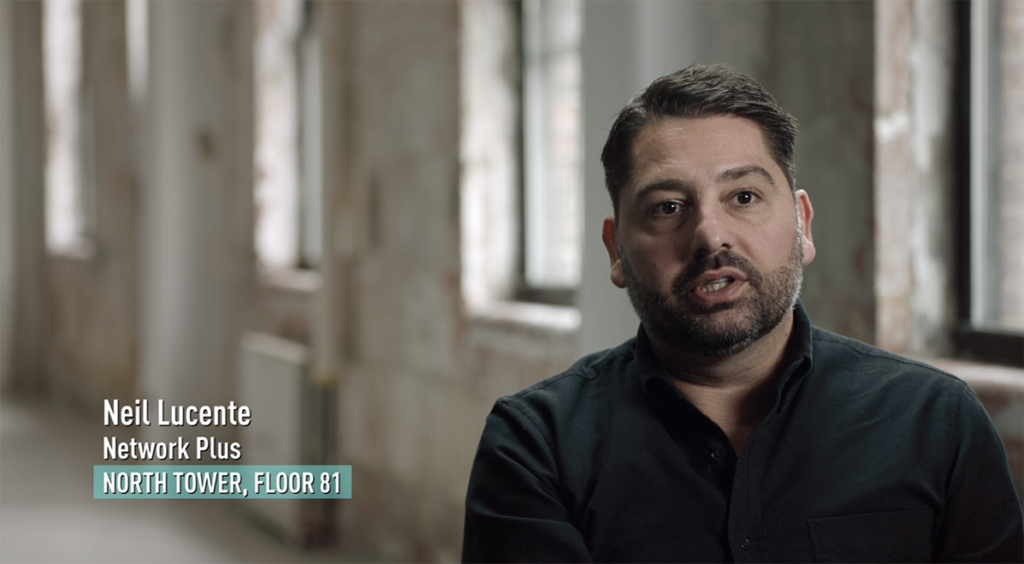
Neil Lucente ’97 works on the sixth floor of a 10-story building, and it’s unlikely he’ll choose to travel any more vertically than that for a job. His sole reminder of his time in a high-rise is the bathroom key from the 81st floor of the World Trade Center’s North Tower that he keeps on his keychain.
Lucente and fellow Clarkie Peter Doran ’98 were working for a telecom company on the 81st floor on Sept. 11, 2001, when they entered the elevator with several co-workers. Then the first plane hit.
“It was the loudest sound I’ve ever heard,” Lucente recalls. “The building was shaking so violently, it felt like a giant shaking a tin can with us inside it.” The doors to the elevator hadn’t yet closed, and Lucente could see that the doors had been blown off the bank of elevators across the hallway and fire was raining through the shaft. The ceiling was collapsing, and the floor had split open.
The group fled down the stairwell, remembering the disaster drill instructions that had been developed following the 1993 bombing attempt at the World Trade Center. They stopped at a rendezvous point on the 78th floor, then continued to descend to the 40th floor. There, Lucente walked over to an office window to survey the scene outside.
“It was actually a serene sort of sight,” he remembers. “The sky was a gorgeous blue, papers were floating down, and falling glass was tinkling down the side of the building making a sound like wind chimes. I had this moment of almost peace.” His brief respite was ended when the second plane rammed into the South Tower, sending a fireball through that blue sky.
Lucente joined the crowd as it hurried down the stairs. The procession was orderly, he says, and the stairwell eerily quiet. “The terror was silent, but you could see in people’s faces that they thought they were going to die at any second.” Periodically, he encountered the wounded, some of them burned so badly that their race or gender were indefinable.
He finally reached the ground floor, relief enveloping him. But when he emerged onto the plaza, the scene was chaotic — piles of burning debris, smoke everywhere, and the prone bodies of those who had leapt to escape the flames. “It was post-apocalyptic,” he says. “Beyond unbelievable.”
After being led by police to an underground mall, and then back out, Lucente had about 15 seconds before the South Tower collapsed. As a police officer shouted, “Run! Run!” Lucente instinctively looked up, and was shocked to observe both buildings on fire. He’d thought the fireball he’d seen on the 40th floor had been a residual blast from the North Tower (he would only learn the details of the attack later after reaching his home and turning on the TV). When the officer yelled, “Run!” Lucente “picked a direction and ran,” putting as much distance as he could between himself and the falling tower.
Both Lucente and Doran later recounted their ordeal in a History Channel documentary. When he watches it, Lucente pauses on the scene of billowing smoke whipping around a corner and engulfing everyone escaping down that street. He was among them.
Lucente acknowledges that he lived with PTSD for several years after the attack (“I think we all had PTSD” he says of the survivors). He stayed away from any profession that would situate him in a high-rise and instead worked in restaurants and bars for a time. Today, he’s the director of talent acquisition at Renaissance Learning.
Major 9/11 anniversaries, like this year’s, evoke powerful and difficult memories, Lucente says. But it’s okay, because he doesn’t want to forget. That’s why he keeps the key to a door on the 81st floor of a building that no longer exists.
Read more:


